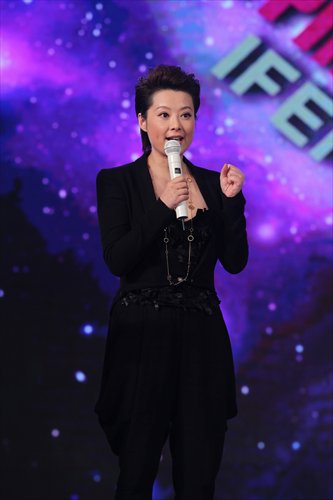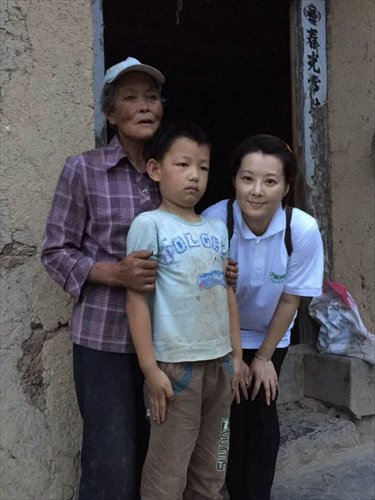HOME >> CHINA
Actress Yuan Li turns to activism after successful screen career
By Zhang Yu Source:Global Times Published: 2015-10-9 5:03:01

Yuan Li in a charity event in 2014 Photo: CFP

Yuan visits the family of a deceased black lung disease patient in Hubei Province in July. Photo: Courtesy of Yuan Li
If you visit the Weibo (microblog) page of Yuan Li, you wouldn't have imagined that she's an actress. The latest Weibo entries of the 42-year-old, hailing from Hangzhou, Zhejing Province, include one on garbage sorting, one on the passing of the Trans-Pacific Partnership agreement, and several on the death of one of the black lung patients who she visited in July with an NGO.
Although she was most famous in the early 2000s, Chinese people still vividly remember Yuan's television characters. They include Du Xiaoyue, the witty, outspoken and feisty Beijing Opera actress in The Eloquent Ji Xiaolan, one of the most watched Qing Dynasty television series in the 2000s, and Ouyang Lanlan, the headstrong daughter of a drug lord who fell tragically in love with an undercover cop.
Just like her roles, Yuan is also outspoken, feisty and sometimes headstrong in her life choices - on November 2011, after knowing each other for just four months, Yuan married Canadian lawyer Blaine Grunewald and moved to the US. It was her second marriage. She later told the media that their marriage had been bumpy, and three years later, through her blog posts, people found that she had quietly returned to China.
Quitting acting
2014 was also the year when China's entertainment industry went through a big change. South Korean-style reality shows dominated China's television screens, and actors are increasingly seen on the screen playing themselves. "When I returned, I found there were very few decent screenplays for me. Actors and producers now seem more keen on television competitions and games. I'm less than interested," she told the Global Times.
Yuan has always been something of an outcast in the entertainment industry. She has very few actor friends, and directors who have worked with her said she doesn't like socializing with others in the set. Her forthrightness has built her enemies. While she played several successful roles, her career has been far from glorious. She even feels uncomfortable when Weibo automatically puts her under the "celebrities" column when it helps users to categorize the accounts they're following.
The changing environment made Yuan decide to take a break. She now spends time in her homes in Shanghai, Hangzhou and Beijing and occasionally abroad, often burying herself in books. She reads Greek philosophy and often quotes famous Chinese authors like Lu Xun. "It's not that these books have any practical benefits, but I like the fact that each one of them became part of me after I read them," she said.
"As an actress I used to be like a bull, being pulled by the nose ring where to go and what to do. Now I'm free. I want to take some time to figure out what I really want to do," she said.
Weibo presence
Yuan found an answer in the public sphere, where she started to involve herself actively.
Chinese celebrities are known to avoid commenting on public or political affairs, fearing they might cross the line or be misunderstood as drawing attention to themselves. Even the most publicly involved actors would go no further than praying for peace after a national disaster, or writing a slogan-like call for justice on Weibo.
Yuan's involvement would probably give her agent a nervous breakdown - if she were still an active actress. In 2014, she became a major voice for Christians in China's public sphere when officials in Zhejiang Province ordered over 200 churches to remove their crosses in a campaign to demolish and renovate what officials there consider to be dangerous buildings. Although local officials said the crosses were taken down only for safety reasons, the campaign drew massive protests by Christians in the province.
Yuan became a Christian in 2007, after a visit to the Notre Dame in Paris when she said she had a dramatic transformative experience inside the cathedral, a sudden enlightenment which she later learned was called "the moving of the Spirit" in Christianity. A devout Christian, she prays before every meal and likes to study theology in her spare time.
After reading news about the demolition, Yuan felt an obligation to speak out and posted the chain of events closely on her Weibo, although her posts were often deleted by censors. "Normally, as an actress, I didn't like to speak out about public events. But I would question my faithfulness if someone is removing crosses in front of my home and I do nothing," she told the Global Times.
While her efforts won her the support of some fellow Christians and allowed more people to know about the incident, they also led to vicious, nationalist comments insulting her motives and questioning her foreign religion. "If it was during the Cultural Revolution, the Red Guards would probably break into my house and beat me. Now they can only do that behind their computer screens. I guess it's already huge progress," she said.
Becoming an activist
Yuan's latest engagement is volunteering with Love Save Pneumoconiosis, a non-governmental group founded by Wang Keqin, an investigative journalist, dedicated to raising awareness of the disease and providing help for sufferers.
Commonly known as the black lung disease, the deadly pneumoconiosis is a common occupational disease among China's coal miners, with an estimated 6 million sufferers. Many have sought compensation from mining companies, but few had succeeded.
Among the numerous charity projects in China, Yuan picked this one after careful consideration. She thought it's easier for children living under poverty and those suffering rare diseases to draw compassion, yet she wanted to help those who are ignored and desperately in need.
In July, she spent over 10 days in the mountainous areas in Hubei and Shaanxi provinces, visiting the families of former mine workers who are living with the disease. The poverty there struck her so much that she soon began to hand out cash, withdrawing the bank machine's daily cap of 20,000 yuan every day because money from the NGO takes time to arrive. She also built an intimate relationship with local patients, adopting herself a godson.
"The existence of pneumoconiosis is the result of a failed labor system and ignorance of human rights," she told the Global Times. Unlike those born with rare diseases, she thinks this disease is something that can be fought with raised awareness.
Newspaper headline: Life after fame
Posted in: Profile